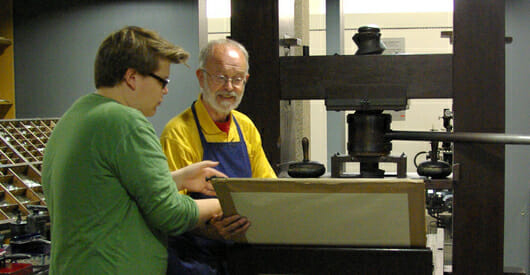
Of the many many incredible possibilities presented by a networked world, one of the most productive is the ability to use other people’s expertise.
In the pre-Google era, it could be challenging to find experts in an area you needed to know about. At various times over the years I’ve had to research direct mail selling, copywriting, book manufacturing, the early history of printing, best practices for letterpress printing operations, and a slew of other things I needed to learn.
It was—and sometimes still is—a laborious and risky endeavor.
Consultants are simply people with experience and the ability to communicate it to others in similar situations. That can be incredibly valuable when you’re starting out in a new field.
The Value of Mentors, Experts and Consultants
I don’t know about you, but when I start something new I usually begin by doing some reading. Sometimes a lot of reading. I feel a need to have an intellectual understanding of the whole system before I take that first step. Maybe I’ll make a mistake. Maybe that mistake will be permanent. It just seems better to do nothing until I really “have it down.”
Of course, this kind of thinking leads to the swamp of inaction, from which many people never return. And that’s where mentors, experts and consultants come in.
Instead of looking up at a daunting learning curve, instead of realizing we really have no idea how this whole new business of publishing works, we can short-cut the whole process.
By relying on people who have traveled this ground before, we flatten the learning curve. What this means in practical terms is that we cut weeks, months, or even years off the time it will take us to reach our goals.
Since discovering this method, I’ve hired numerous consultants and other experts to do those things that I couldn’t do, or to give me the guidance I needed in order to understand how to proceed on my own.
I’ve paid for help on setting up this blog, for instance, and for the guidance in how to establish a blog as a business in today’s climate. I’ve hired experts in internet marketing to point out the ways I can expand my business. I’ve paid for expertise in applying to schools, hired teachers to correct my form, and paid for group lessons from expert chefs to crack the code on recipes I wanted to thoroughly understand. I’ve paid for writing instruction, lessons in stretching, and French lessons.
Consulting Isn’t Coaching
Hiring a consultant is usually a well-defined transaction. This isn’t coaching, where a relationship may develop over time, and the coach is both teacher and inspiration.
And it’s not therapy, where you delve into motivations and behavior issues.
No, this is a straight transfer of information. One person knows how it works, the other needs to know. It’s information marketing but using people as one-to-one marketers.
The Problem with Self-Publishing
Over the last 18 months I’ve talked to dozens of authors who are thinking about self-publishing, or already have a book out, or are just curious about how the whole thing works.
Many of these authors are experts in their own right. They own successful companies, or they are executives at corporations, or they have a long career in some other field.
Confronted with the odd combination of knowledge needed to effectively publish books—esoteric attention to numerous areas of detail that follow strange rules, and the ongoing technological and commercial changes washing through the industry—many of these smart people just get stuck.
About a year ago I started offering “Q & A” sessions to some of these authors I met, and many of them jumped at the opportunity. I offered to sit with them for an hour and let them ask every question they wanted to, especially the most inane, simple, idiotic questions. The ones you won’t ask at a meeting because you think everyone else knows the answer already. I know about those questions, because that’s where I get stuck, too.
The people who took me up on this offer saw the chance to cut through all the disjointed information that was confusing them about:
- Print on demand, and how it actually works in practice
- Copyright, and what you really need to do
- Costs, and what they could expect for their specific book
- Social media, and how it can be used to market their book
- Prices, and how to understand the whole book distribution and discount system
- Book production, and how to figure out the best options for their own publication
I tell them to send me their questions, or write them down and bring them along to our meeting. We run down the items on their list, and I explain how “the pieces fit together,” and how to take the next step toward publication.
Here’s My Offer
Now, through the magic of the internet, I want to offer the same thing to you. If you’re thinking about self-publishing, and if you’re serious about putting out a quality book, this could save you a lot of time, aggravation and money.
If you find this idea appealing, and want to have a one-on-one about your book, your plans, and how to reach your goals, I hope you’ll get in touch. I want to help you up that learning curve so you can get to the good part, and really enjoy becoming a self-published author.
For more information on Q & A With The Book Designer, click this link or the ad in the sidebar, and let’s talk.
Image licensed under a Creative Commons Attribution 3.0 License, original work copyright by bjornmeansbear, https://www.flickr.com/photos/bjornmeansbear/


